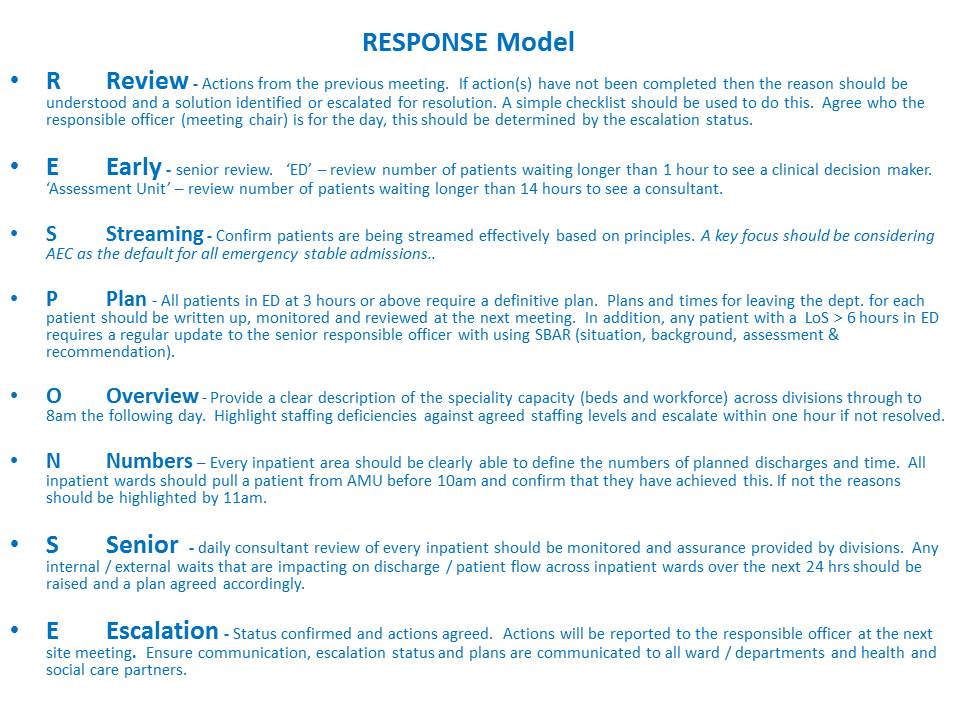- A structured and action focused site meeting to maintain safe patient flow.
- A simple set of rules to create robust discussion and agree clear actions to rapidly respond to periods of increasing escalation.
- Control and management of a hospital site using a set of simple rules.
- The site meeting should take no more than 20 minutes. The responsible officer chairing the site meeting (and required attendees) needs to be agreed and linked to escalation status / plan.
E Early Senior review. In ED review the number of patients waiting longer than 1 hour to see a clinical decision maker. IN assessment units or admitting wards review the number of patients waiting longer than 2 hours between 8am to 8pm or 14 hours between 8pm – 8am to see a consultant. The aim should be for all patients requiring a daytime admission from ED to be reviewed by a consultant within 2 hours. Evening admissions should be reviewed within 2 hours by a senior doctor and a have a ‘consultant delivered review’ the following morning.
S Streaming. Confirm patients are being streamed effectively based on principles outlined in The 6As of managing medical emergencies. A key focus should be considering Ambulatory Emergency Care as the default for all stable emergency admissions. Specialties should offer advice lines to refers with the potential to offer an out-patient appointment if required.
P Plan - All patients in ED at 3 hours or above should have a clear case management plan. The case management plan should include planned investigations; treatment and when required specialty referral, for each patient should clearly documented, monitored and reviewed at the next meeting. For frail patients this should include a review of functional criteria for discharge involving a therapist. In addition, any patient in the ED for longer than 6 hours should be escalated to the senior responsible officer with using SBAR (situation, background, assessment & recommendation) to confirm all appropriate actions have been taken.
O Overview - Provide a clear description of the speciality capacity (beds and workforce) across divisions through to 8am the following day. Highlight staffing deficiencies against agreed staffing levels and escalate within one hour if not resolved. Check the today’s data against the predicted numbers of attendances and admissions, ensure the staffing bed and diagnostic capacity is available to manage the predicted caseload.
N Numbers – Every inpatient area should be clearly able to define the numbers and times of planned discharges. This should be updated after senior review. Simple discharges should be prioritised by accelerating investigations, specialty review and medication for discharge. All inpatient wards should pull a patient from AMU before 10am and confirm that they have achieved this. If not the reasons should be highlighted by 11am.
S Senior. Daily consultant review of every in-patient should be implemented & monitored. Any internal / external waits that are impacting on discharge / patient flow across inpatient wards over the next 24 hrs should be raised and a plan agreed accordingly.
E Escalation. Escalation status should be confirmed and actions agreed. Action cards are a useful method for ensuring key individuals are aware of the required actions. Actions will be reported to the responsible officer at the next site meeting. Ensure communication, escalation status and plans are communicated to all ward / departments and health and social care partners. Partner organisations must ensure that their agreed actions are implemented for the agreed level of escalation.
Key Principles to work towards
Early Senior Review
- All patients presented to ED will be seen by a clinical decision maker within 60 minutes.
- The AEC unit and assessment units should have immediate access to a senior doctor who is responsible for agreeing the case management plan for each patient on arrival.
- All patients requiring a daytime admission from ED should be reviewed by a consultant within three hours. Evening admissions should be reviewed within three hours by a senior doctor and a have a ‘consultant delivered review’ the following morning.
- GP referrals and hospital transfers accepted by a specialty are admitted directly to an assessment unit or specialty ward, when this cannot be achieved the patients should be assessed by a senior specialty doctor within 30 minutes of arrival in ED.
- All patients streamed to minors should be discharged or appropriately transferred within 2 hours from arrival.
- All patients streamed to majors should have a management plan signed off by ED Consultant shift lead by 3 hours.
- All patients referred as an emergency referral should be considered for AEC management as a first line unless they are clinically unstable. The unit should be considered for all ambulant patients with a low NEWS (national early warning) score.
- All assessment units should have 1 assessment area available at all times to accept patients directly.
- 33% of patients will be discharged from base inpatient wards before midday. TTO’s (medication to take home) for planned discharges should be prescribed and with pharmacy by 3pm the day prior to discharge wherever possible to do so.
You can follow Steve on Twitter @SteChristian21


